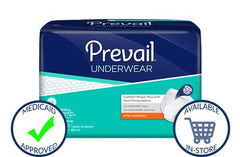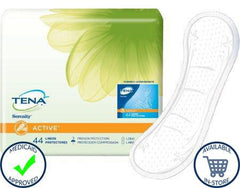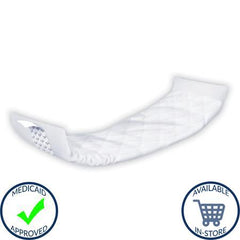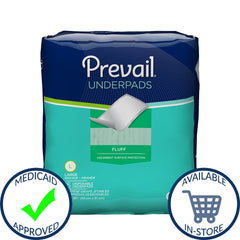How to Manage Incontinence

For many, incontinence is embarrassing and overwhelming to deal with. If not properly addressed, it can leave people feeling helpless or dependent on the support of their friends, family, or caregivers. Luckily, there are an assortment of products and tools that can be used to mitigate the problem.
If you Struggle with Incontinence, you are not Alone
Per the CDC’s National Home and Hospice Care Survey of 2007, over 60% of men and women who are 65 or older report having a slight to severe difficulty controlling their bladder or bowels. Facing incontinence can range from a minor nuisance to a crippling obstacle to overcome. With the proper solutions and care, maintaining your independence while dealing with incontinence is a completely realistic expectation.
One common misconception about incontinence products is that they are only for women, or only for men. Whether you’re male or female, there are many gender neutral and gender specific supplies that can be used every day to negate the annoyances that accompany incontinence.
Due to the vast nature of the problem, there are hundreds of brands and products designed to ease the symptoms of incontinence. If you don’t know where to start looking or which products could benefit you, Professional Medical Corp can offer you recommendations, advice, and free samples of our top brand products via our toll-free number, (800) 741-3996. We’re here to help, those who call will be met with a live and certified Continence Coach. We know that everyone faces their own unique struggles with the issue, which is why you will never be met with an automated and ambiguous answer upon calling.
Supplies such as protective underwear, briefs, pant liners, inserts, and underpads are among the most commonly used incontinence products to maintain independence.
PROTECTIVE UNDERWEAR
 Protective underwear, commonly referred to as pull-ons or disposable underwear, are the most commonly purchased type of full coverage incontinence product for adults with moderate needs. Protective underwear can be put on the same way as your regular underwear and feature tear-away sides to allow easy removal. Coming in a variety of sizes, absorbency levels, and styles, protective underwear offers seniors a discreet and comfortable option.
Protective underwear, commonly referred to as pull-ons or disposable underwear, are the most commonly purchased type of full coverage incontinence product for adults with moderate needs. Protective underwear can be put on the same way as your regular underwear and feature tear-away sides to allow easy removal. Coming in a variety of sizes, absorbency levels, and styles, protective underwear offers seniors a discreet and comfortable option.
BRIEFS

Incontinence briefs, or adult diapers, are a full coverage product with tape tabs that allow for easy adjustment. Typically, the absorbency and cotton fluff cover the length of the product and are wider in the back to offer additional protection when laying down. Briefs come in a variety of absorbency levels, from light to night time coverage.
PANT LINERS
 Pant liners, or incontinence pads, are designed to be used by adults who have light incontinence needs. They are simply placed inside your regular underwear and come in multiple sizes and styles to provide comfortable options. Pant liners have waterproof backing and adhesive strips so that they stick but are easily removed.
Pant liners, or incontinence pads, are designed to be used by adults who have light incontinence needs. They are simply placed inside your regular underwear and come in multiple sizes and styles to provide comfortable options. Pant liners have waterproof backing and adhesive strips so that they stick but are easily removed.
INSERTS
 Incontinence inserts, also known as diaper doublers or booster pads, are a category of products that add additional layer of absorbency to other products like protective underwear or adult diapers. Used inside the brief or pull on, often for nighttime use, inserts provide an extra layer of protection for your peace of mind. Inserts do not have the same waterproof backing as pant liners, so they should not be used inside of your regular cloth underwear instead of protective underwear.
Incontinence inserts, also known as diaper doublers or booster pads, are a category of products that add additional layer of absorbency to other products like protective underwear or adult diapers. Used inside the brief or pull on, often for nighttime use, inserts provide an extra layer of protection for your peace of mind. Inserts do not have the same waterproof backing as pant liners, so they should not be used inside of your regular cloth underwear instead of protective underwear.
UNDERPADS
 Underpads provide immeasurable benefits to those with incontinence needs. Underpads are frequently used at night and provide an extra layer of absorbent protection for bedding. Underpads, much like pant liners, feature a waterproof backing that will guarantee the safety of your bed sheets. There are two main types of underpads, disposable and reusable. When searching for the right underpad for you, it is important to choose a size that will cover the area it will be used on.
Underpads provide immeasurable benefits to those with incontinence needs. Underpads are frequently used at night and provide an extra layer of absorbent protection for bedding. Underpads, much like pant liners, feature a waterproof backing that will guarantee the safety of your bed sheets. There are two main types of underpads, disposable and reusable. When searching for the right underpad for you, it is important to choose a size that will cover the area it will be used on.
MEDICAID
If you are a Washington state resident covered by Medicaid, then you are likely eligible for a mix of the products mentioned in this article at no out-of-pocket cost and shipped directly to your door. For those who this applies to, call us toll-free at (800) 741-3996 for assistance in using your Medicaid benefits to get the supplies you need. Unfortunately, Medicare does not cover the cost of incontinence supplies.
- Trey Munsell












Comments 0